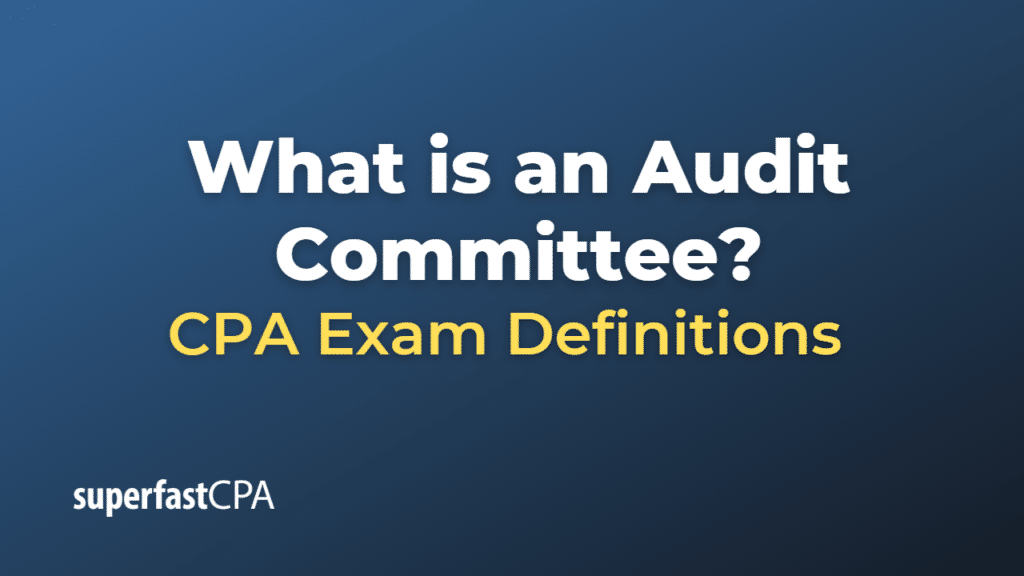Audit Committee
An audit committee is a subcommittee within a company’s board of directors, responsible for overseeing the company’s financial reporting process, internal controls, and risk management. The committee plays a crucial role in maintaining the integrity of the company’s financial statements and ensuring that they comply with accounting standards and regulatory requirements.
Key responsibilities of an audit committee typically include:
- Selection and oversight of external auditors: The audit committee is responsible for appointing, compensating, and overseeing the work of external auditors. It also evaluates their independence and performance and ensures that their services comply with applicable regulations.
- Review of financial statements: The audit committee reviews the company’s quarterly and annual financial statements before they are released to the public or submitted to regulators. This includes assessing the appropriateness of accounting policies, the reasonableness of significant estimates and judgments, and the adequacy of financial statement disclosures.
- Internal controls and risk management: The audit committee assesses the effectiveness of the company’s internal control systems, including the processes in place for identifying, managing, and monitoring financial and operational risks.
- Internal audit function: The audit committee oversees the company’s internal audit function, ensuring it is adequately resourced and independent from management. It reviews the internal audit plan, monitors the execution of audits, and assesses the findings and recommendations.
- Compliance and ethics: The audit committee monitors the company’s compliance with laws, regulations, and ethical standards. It may also oversee the implementation of a code of conduct or ethics policy and review the processes for reporting and addressing concerns related to misconduct or fraud.
Members of the audit committee are typically independent, non-executive directors with financial expertise and experience in corporate governance. In some jurisdictions, regulations require that audit committee members meet specific independence and financial literacy criteria to ensure the committee’s effectiveness and objectivity.
Example of an Audit Committee
Let’s take a hypothetical example of a publicly-traded company, XYZ Corporation. XYZ Corporation’s board of directors has an audit committee comprising three independent, non-executive directors: Jane Smith (Chair), John Brown, and Alice Johnson.
- Selection and oversight of external auditors: The audit committee at XYZ Corporation is responsible for selecting a reputable accounting firm, such as Deloitte, to conduct the annual external audit. The committee reviews the audit plan, approves the audit fee, and monitors the audit progress. After the audit, the committee discusses the audit findings and recommendations with the auditors and ensures that management addresses any identified issues.
- Review of financial statements: Before the release of XYZ Corporation’s quarterly and annual financial statements, the audit committee reviews them thoroughly. They discuss the financial results with the CFO, question any significant changes in accounting policies, and evaluate the reasonableness of management’s estimates and judgments. If the committee is satisfied with the financial statements, they recommend their approval to the board of directors.
- Internal controls and risk management: The audit committee evaluates XYZ Corporation’s internal controls and risk management processes. They may review reports on internal controls prepared by the internal audit team or external consultants and discuss identified weaknesses or deficiencies with management, ensuring that appropriate remediation actions are taken.
- Internal audit function: XYZ Corporation has an internal audit department, led by a Chief Audit Executive who reports functionally to the audit committee. The committee reviews and approves the annual internal audit plan, discusses audit results, and monitors the implementation of recommended actions.
- Compliance and ethics: The audit committee at XYZ Corporation oversees the company’s compliance with laws and regulations, as well as its adherence to ethical standards. They review reports on compliance and ethics matters, such as violations of the company’s code of conduct, and ensure that appropriate actions are taken to address any issues.
In this example, the audit committee of XYZ Corporation plays a crucial role in maintaining the integrity of the company’s financial reporting and ensuring effective internal controls, risk management, and compliance with laws and regulations.













